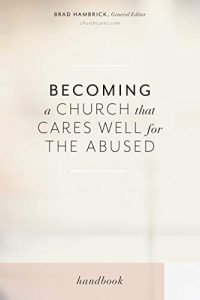The following is a 12-minute audio clip from the Conversations That Matter video on the Caring Well Initiative.
The following text is from two slides Jon showcases in his presentation.
 The Caring Well Initiative [a conference hosted by the ERLC and held October 3-5, 2019], which did not platform male victims in their teachings, paralleled the same kind of thinking behind the Me Too movement’s “believe women” slogan. Women who experienced sexual abuse were more qualified to advise pastors and churches on the topic of sexual abuse than were pastors who rightly understood and applied Scripture’s teaching on the subject. Not only was their voice necessary for solving sexual abuse, but their stories were generally accepted without affirming the importance of verification. in the book Becoming a Church That Cares Well for the Abused [available as a PDF download from the churchcares.com website and this link], Caring Well contributors provided additional training in which they emphasized the importance of believing victims.
The Caring Well Initiative [a conference hosted by the ERLC and held October 3-5, 2019], which did not platform male victims in their teachings, paralleled the same kind of thinking behind the Me Too movement’s “believe women” slogan. Women who experienced sexual abuse were more qualified to advise pastors and churches on the topic of sexual abuse than were pastors who rightly understood and applied Scripture’s teaching on the subject. Not only was their voice necessary for solving sexual abuse, but their stories were generally accepted without affirming the importance of verification. in the book Becoming a Church That Cares Well for the Abused [available as a PDF download from the churchcares.com website and this link], Caring Well contributors provided additional training in which they emphasized the importance of believing victims.

The book instructed pastors and ministry leaders to emphasize their belief in the victim’s story and create a “safe space” where the victim felt believed. Leaders were to disregard “innocence until proven guilty” since it only applied in the legal realm, while instead practicing Paul’s teaching in 1 Corinthians 13:7 that “love believes all things.” According to the book, a victim may suffer more trauma from not being believed than from their actual abuse.1 This made reflexively believing victims a top priority.
However, in the context of 1 Corinthians 13:7, Paul was correcting the way Corinthian Christians pridefully misused their spiritual gifts by contrasting their arrogant attitudes with a spirit of love. Paul did not teach that victims had the right to be believed simply because of their stated experience or gender. Instead, he described the kind of encouraging attitude Christians should have toward each other in using their spiritual gifts. As Puritan Theologian Matthew Henry stated, “charity does by no means destroy prudence.” Paul himself did not immediately believe every detail of an accusation just because it was made. Other passages warn against believing everything one is told without consideration in both the civil and ecclesiastical as well as the personal realm. Love does not compel someone to immediately believe a story simply because it came from claiming a victim experience. As 1 Corinthians 13:6 states, “[Love] rejoices with the truth.”
1The book says studies indicate this, but no studies are cited, at least on the page where the claim is made. Why can’t an accuser be taken seriously and treated with respect without the one hearing her (or him) necessarily reaching any hard and fast conclusion? Wouldn’t the best and most appropriate response be, not believing the accuser right at the outset, but not disbelieving that individual? The one in whom the accuser is confiding should treat the individual with respect and the information worthy of investigation. This is consistent with the principles of biblical justice.
This page is part of a larger Word Foundations article.
